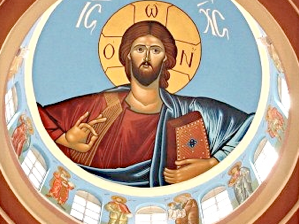Cyril of Alexandria on the Extra Calvinisticum?
As I was reading through James Anderson’s intriguing volume Paradox in Christian Theology I came across this citation from Cyril of Alexandria that reminds me that the so-called “extra Calvinisticum” (the idea that the Son of God is not circumscribed by or limited to the human body of Jesus Christ) is not the property of the Reformed wing of the church but was the view of many before the time of John Calvin.
We confess that the Only begotten Word of God, begotten of the same substance of the Father, True God from True God, Light from Light, through Whom all things were made, the things in heaven and the things in the earth, coming down for our salvation, making him of no reputation, was incarnate and made man; that is, taking flesh of the holy Virgin, and having made it his own from the womb, he subjected himself to birth for us, and came forth man from a woman, without casting off that which he was; but although he assumed flesh and blood, he remained what he was, God in essence and in truth. Neither do we say that his flesh was changed into the nature of divinity, nor that the ineffable nature of the Word of God has laid aside for the nature of flesh; for he is unchanged and absolutely unchangeable, being the same always, according to the Scriptures. For although visible and a child in swaddling clothes, and even in the bosom of his Virgin Mother, he filled all creation as God, and was a fellow-ruler with him who begat him, for the Godhead is without quantity and dimension, and cannot have limits.*
Believe it or not this can preach. In a sermon on Hebrews 1:1-3 I have done it. The incarnation is mind-blowing. Even more so, that the Son of God would die in the place of his sinful people staggers the imagination. We worship a great God: Father, Son, and Holy Spirit. It is this God who has saved us and no other. Soli Deo Gloria!
The citation from Cyril of Alexandria can be found in his Third Epistle to Nestorius in the Nicene and Post-Nicene Fathers, Series Two, vol. 14. You can find the 38 volume Early Church Fathers set published by T&T Clark/Eerdmans and more recently by Hendrickson Publishers. The citation is found in James Anderson, Paradox in Christian Theology: An Analysis of Its Presence, Character, and Epistemic Status (Paternoster/Wipf & Stock: Milton Keyes/Eugene, 2007), 86n66.




Pingback : Water Is Thicker Than Blood
Why is it so hard to find the original Greek and Latin?!!
(Ἐπόμενος δὲ πανταχοῦ ταῖς τῶν á¼Î³Î¯Ï‰Î½ ΠατÎÏων á½Î¼Î¿Î»Î¿Î³Î¯Î±Î¹Ï‚, αἷ πεποίηνται, λαλεῦντος á¼Î½ αá½Ï„οῖς τοῦ á¼Î³Î¯Î¿Ï… Πνε´θματος, καὶ τὸν τῶν á¼Î½ αá½Ï„οῖς á¼Î½Î½Î¿Î¹á¿¶Î½ ἰχνηλατοῦντες σκοπὸν, καὶ βασιλικὴν á½§ÏƒÏ€ÎµÏ á¼Ïχόμενοι Ï„Ïίδον,) φαμὲν ὃτι αá½Ï„ὸς ὠμονογενὴς τοῦ Θεοῦ Λόγος, á½ á¼Î¾ αá½Ï„ῆς γεννηθεὶς τῆς οῦσίας τοῦ ΠατÏὸς, á½ á¼Îº Θεοῦ ἀληθινοῦ Θεὸς ἀληθινὸς, τὸ φῶς τὸ á¼Îº φωτὸς, ὠδι᾽ οὗ Ï„á½° πάντα á¼Î³á½²Î½ÎµÏ„ο, τά τε á¼Î½ Ï„á¿· οá½Ïανῷ καὶ Ï„á½° á¼Î½ τῇ γῇ …
http://godshammer.wordpress.com/2010/05/16/choosing-paradox-part-one/